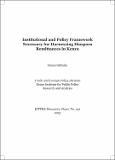| dc.description.abstract | Many countries, Kenya included, are aware of the developmental potential the
diaspora can offer to their countries of origin, especially through their remittances.
This study sought to explore the extent to which Kenya has created the necessary
institutional and policy framework to tap into diaspora remittances. The
study made use of literature review and comparative case studies to realize its
objectives. The study has revealed that Kenya lacks appropriate institutional and
policy framework to harness and channel diaspora remittances to realize certain
predetermined objectives. Diaspora related outcomes are largely left to chance
and are not willed or premeditated upon. The characteristics of the diaspora
are largely unknown and diaspora engaging institutions are far much weaker
compared to those of India and Ethiopia. The policies of engaging the diaspora,
such as those adopted by Ethiopia are to a great extent ‘one-way-street’ and lean
more towards the category of extracting obligation. In addition, policies and
institutions for engaging the diaspora operate independent of each other, with
no synergies between them. The study proposes the formation of a ‘one-stopshop’
to handle all matters related to the diaspora, such as informational issues,
trade, investment and to protect the rights of the diaspora, especially the low
skilled emigrants. As a first step, the created institution(s) must seek to know
and understand its diaspora to enable creation of appropriate policy responses
to tap into its development potential. | en |

